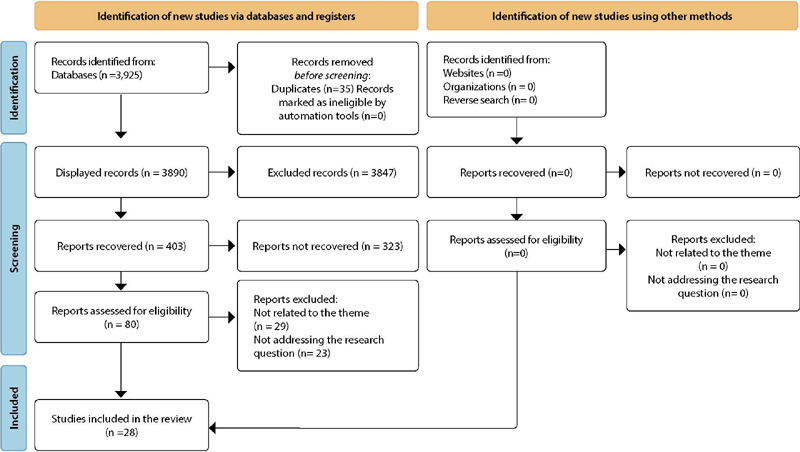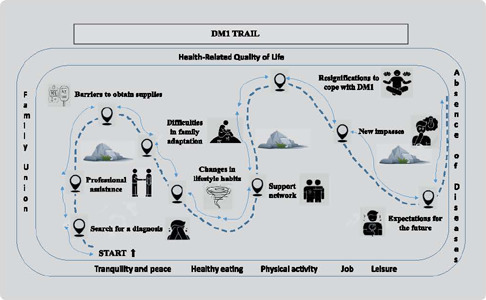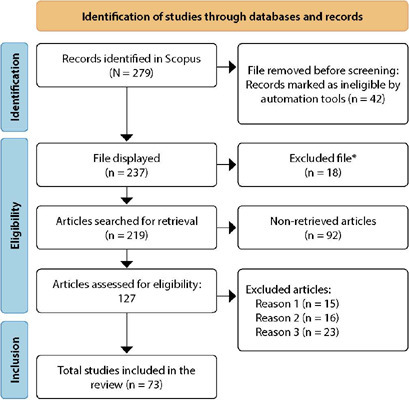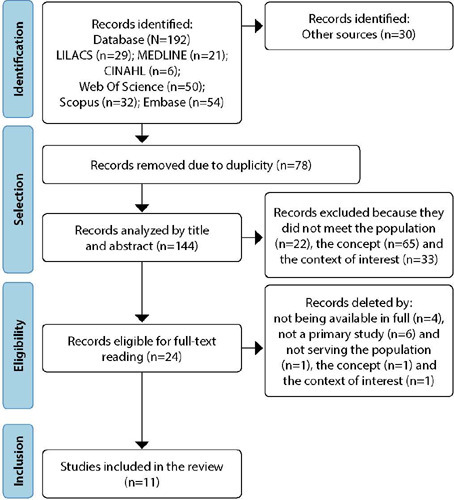-
ORIGINAL ARTICLE06-14-2024
Mid-range theory of the nursing diagnosis Overweight
Revista Brasileira de Enfermagem. 2024;77(2):e20230372
Abstract
ORIGINAL ARTICLEMid-range theory of the nursing diagnosis Overweight
Revista Brasileira de Enfermagem. 2024;77(2):e20230372
DOI 10.1590/0034-7167-2023-0372
Views0See moreABSTRACT
Objective:
To build a mid-range theory for the nursing diagnosis Overweight in adolescents and young adults.
Methods:
A methodological study in the light of the theoretical frameworks of Roy and of Lopes, Silva and Herdman. A total of 3,925 articles were retrieved and assessed using the State of the Art Through Systematic Review software. The final sample consisted of 28 articles.
Results:
The findings converged to 3 essential attributes, 13 antecedents, and 7 consequences. A mid-range theory was built consisting of an illustrated diagram, 11 propositions, and 12 causal relationships.
Final considerations:
From the creation of the theory, it was possible to better understand the nursing diagnosis Overweight within the context of adolescents and young adults. Understanding nursing phenomena contributes to nursing science’s advancement and strengthening.

-
ORIGINAL ARTICLE06-14-2024
Cardiovascular Risk and Lifestyle: comparison between teaching workers in Portugal and Brazil
Revista Brasileira de Enfermagem. 2024;77(2):e20230354
Abstract
ORIGINAL ARTICLECardiovascular Risk and Lifestyle: comparison between teaching workers in Portugal and Brazil
Revista Brasileira de Enfermagem. 2024;77(2):e20230354
DOI 10.1590/0034-7167-2023-0354
Views0ABSTRACT
Objective:
Compare Cardiovascular Risk between workers in Brazil and Portugal who work in the teaching context and its relationship with Lifestyle and Common Mental Disorder.
Methods:
Cross-sectional study that compared the cardiovascular health conditions of teaching workers in Manaus (Brazil) and Coimbra (Portugal). The odds ratio between groups was estimated.
Results:
The differences were: Smoking and hypercholesterolemia in participants from Portugal. Hypertension, chronic disease, increased abdominal perimeter, common mental disorder, and absence from work in Brazil. The variables with the greatest effect for high cardiovascular risk were: Country-Portugal [17.273 (95%CI1.538-193.951)], sex-male [61.577 (95%CI5.398-702.469)] and smoking [593.398 (95%CI57.330-6.142.020)].
Conclusion:
The differences in risk between groups showed that participants from Portugal, men, with high blood pressure and/or smokers are the most vulnerable to having a cardiovascular event. There is a need for interventions to promote cardiovascular health in the workplace in both countries.
Keywords:Community-Based Participatory ResearchHeart Disease Risk FactorsLife StyleOccupational HealthUniversitiesSee more -
ORIGINAL ARTICLE06-14-2024
Functional performance assessment scale for children and adolescents with cancer: cross-cultural study
Revista Brasileira de Enfermagem. 2024;77(2):e20230331
Abstract
ORIGINAL ARTICLEFunctional performance assessment scale for children and adolescents with cancer: cross-cultural study
Revista Brasileira de Enfermagem. 2024;77(2):e20230331
DOI 10.1590/0034-7167-2023-0331
Views0ABSTRACT
Objectives:
to describe the methodological process of cross-cultural adaptation of the PlayPerformance Scale for Children to Brazilian Portuguese.
Methods:
methodological study of translation and cross-cultural adaptation in six stages: translation, synthesis of translations, back-translation, evaluation by a committee of judges, evaluation by expert nurses, and pretest. The agreement and representativeness of the items were assessed using the content validity index. A minimum value of 80% agreement was considered.
Results:
all stages of the translation and cross-cultural adaptation process were satisfactory. In the evaluation performed by the committee of judges, all items obtained agreement above 80%. Fifteen pediatric nurses conducted the content validation, suggesting necessary modifications for understanding and application. Thirty children and adolescents with cancer were assessed with the scale for the pre-test.
Conclusions:
the scale was cross-culturally adapted to Brazilian Portuguese. The need for psychometric testing in a consistent sample is emphasized.
Keywords:Cross-Cultural ComparisonNursing Methodology ResearchOncologyPediatric NursingPhysical Functional PerformanceSee more -
ORIGINAL ARTICLE06-14-2024
Meanings attributed to health-related quality of life by caregivers of adolescents with diabetes
Revista Brasileira de Enfermagem. 2024;77(2):e20230314
Abstract
ORIGINAL ARTICLEMeanings attributed to health-related quality of life by caregivers of adolescents with diabetes
Revista Brasileira de Enfermagem. 2024;77(2):e20230314
DOI 10.1590/0034-7167-2023-0314
Views0See moreABSTRACT
Objective:
to interpret the meanings attributed to the health-related quality of life by caregivers of adolescents with type 1 diabetes mellitus.
Methods:
qualitative, descriptive-exploratory study of 14 caregivers of adolescents with diabetes developed at the reference outpatient clinic for endocrine diseases in a city in the state of Paraíba. Interviews were performed between May and September 2021. Inductive thematic analysis of the empirical material, and its interpretation in light of the concepts of health-related quality of life and family functioning were performed.
Results:
the meanings attributed by caregivers to the health-related quality of life of adolescents converged on the feeling of being healthy, healthy eating, satisfactory family income, family involvement in care and effective access to the care network.
Final Considerations:
knowledge of these meanings enables health professionals to develop strategies that meet the unique demands of caregivers experiencing this diagnosis.

-
REVIEW06-14-2024
Critical analysis of the scientific production on Jean Watson’s Theory of Human Care
Revista Brasileira de Enfermagem. 2024;77(2):e20230231
Abstract
REVIEWCritical analysis of the scientific production on Jean Watson’s Theory of Human Care
Revista Brasileira de Enfermagem. 2024;77(2):e20230231
DOI 10.1590/0034-7167-2023-0231
Views0See moreABSTRACT
Objectives:
to analyze current scientific production on the use of the theoretical-methodological precepts of Jean Watson’s Theory of Human Care/Clinical Caritas Process.
Methods:
quantitative, exploratory, descriptive study using data from 1979 to 2023 in the Scopus database. Analysis was carried out using VOSviewer software.
Results:
the 73 studies included establish a network of collaboration among 221 authors from 155 institutions in 18 countries, who discuss the development of ethical behavior in nursing staff, through technical improvement, implementation, and validation of instrumental strategies capable of measuring and evaluating the quality of holistic and empathetic care. The Theory of Human Caring contributes to nursing training and care, and Process Clinical Caritas-Veritas is useful for the different possibilities of practice and education.
Conclusions:
it is important to strengthen with more empirical data a nursing work model centered on individual human care, supporting the evolution of scientific nursing knowledge.

-
REVIEW06-14-2024
Primary health care professionals’ practice in the face of leprosy: a scoping review
Revista Brasileira de Enfermagem. 2024;77(2):e20230207
Abstract
REVIEWPrimary health care professionals’ practice in the face of leprosy: a scoping review
Revista Brasileira de Enfermagem. 2024;77(2):e20230207
DOI 10.1590/0034-7167-2023-0207
Views0See moreABSTRACT
Objectives:
to identify Primary Health Care professionals’ practice in the face of leprosy.
Methods:
a scoping review, carried out between November 2022 and January 2023, conducted according to the methodological structure proposed by JBI and checklist Preferred Reporting Items for Systematic Reviews and Meta-Analyses extension for Scoping Reviews in six databases and additional literature.
Results:
the sample consisted of 11 articles, published between 2008 and 2022. The findings were synthesized into three categories: Early diagnosis and timely treatment; Physical disability prevention; and Household and social contact surveillance.
Final Considerations:
there is a need to align the practices carried out with those recommended by the Brazilian National Program for Leprosy Control and Elimination, as some were not identified in studies, which implies losses to qualified assistance directed to patient demands, with a view to control and elimination of leprosy.

-
ORIGINAL ARTICLE06-14-2024
Validity of the TBApp mobile application for self-care management for people with tuberculosis
Revista Brasileira de Enfermagem. 2024;77(2):e20230195
Abstract
ORIGINAL ARTICLEValidity of the TBApp mobile application for self-care management for people with tuberculosis
Revista Brasileira de Enfermagem. 2024;77(2):e20230195
DOI 10.1590/0034-7167-2023-0195
Views1See moreABSTRACT
Objectives:
to describe the validity process of the TBApp mobile application for self-care management for people with tuberculosis linked to Primary Health Care.
Methods:
methodological research developed with ten expert judges, carried out virtually. The application was assessed in relation to content and technology quality in seven domains (objectivity; structure and appearance; relevance; functionality; reliability; usability; and efficiency), using an instrument with a Likert scale.
Results:
TBApp was considered valid, relevant, functional, reliable and effective by expert judges. The objectives, structure and presentation and relevance domains presented an overall Content Validity Index of 0.93, and the functionality, reliability, usability and efficiency domains presented characteristics and sub-characteristics values greater than 0.80.
Conclusions:
TBApp is a creative and innovative tool that can be used by people with TB and disseminated in the scientific community.
-
ORIGINAL ARTICLE12-13-2024
Nurses’ experience regarding patient safety in mobile pre-hospital care
Revista Brasileira de Enfermagem. 2024;77(5):e20230529
Abstract
ORIGINAL ARTICLENurses’ experience regarding patient safety in mobile pre-hospital care
Revista Brasileira de Enfermagem. 2024;77(5):e20230529
DOI 10.1590/0034-7167-2023-0529
Views0See moreABSTRACT
Objectives:
to understand nurses’ experience regarding patient safety in mobile pre-hospital care.
Method:
a qualitative, exploratory and descriptive study, conducted with nurses active in mobile pre-hospital care services. Semi-structured interviews were conducted, audio-graved and submitted to Bardin’s content analysis.
Results:
from four thematic categories established, nurses reported the care and management skills necessary to work in this service. They demonstrated a commitment to ensuring safe care for patients, staff and spectators. They highlighted the actions taken to prevent and mitigate incidents. However, they based their experiences on practice protocols and individual actions, expressing the need to improve knowledge about patient safety.
Final Considerations:
mobile pre-hospital care nurses’ experience in relation to patient safety was limited, suggesting the need for training on the subject, alignment of work processes and implementation of strategies, aiming to guarantee safe care.
-
ORIGINAL ARTICLE12-13-2024
Repercussions of the pandemic on tuberculosis control actions from the perspective of health professionals
Revista Brasileira de Enfermagem. 2024;77(5):e20230477
Abstract
ORIGINAL ARTICLERepercussions of the pandemic on tuberculosis control actions from the perspective of health professionals
Revista Brasileira de Enfermagem. 2024;77(5):e20230477
DOI 10.1590/0034-7167-2023-0477
Views0See moreABSTRACT
Objectives:
to analyze the repercussions of the COVID-19 pandemic on tuberculosis control actions from the perspective of primary health care professionals.
Methods:
this descriptive study with a qualitative approach was conducted from November 2022 to April 2023, using semi-structured interviews with 11 key informant professionals from primary health care units in a Brazilian capital. Data were organized using Atlas.ti 22.0 software and subjected to thematic-categorical content analysis.
Results:
the pandemic scenario caused alterations in the work process, necessitating abrupt adaptations, and led to detrimental impacts on the health of professionals and tuberculosis control actions, which were reduced or discontinued.
Final Considerations:
there was evident unpreparedness and a lack of resources from various governmental levels and health services to handle the public health emergency situation without severe harm to the provision of essential services.
-
Training of Brazilian indigenous nurses: between human rights, valuing diversity and inclusion
Revista Brasileira de Enfermagem. 2024;77(5):e20230430
Abstract
Training of Brazilian indigenous nurses: between human rights, valuing diversity and inclusion
Revista Brasileira de Enfermagem. 2024;77(5):e20230430
DOI 10.1590/0034-7167-2023-0430
Views0See moreABSTRACT
Objectives:
to analyze the possibilities and potential of training indigenous nurses, given the Brazilian Health System (SUS), understanding the relationships between education and health.
Methods:
theoretical-reflective study, based on scientific literature, aligned with the experience, critical thinking of its authors and the Sustainable Development Goals in Brazil.
Results:
this text articulates three axes: Potential for including indigenous students in nursing training; Paths to achieving equity through inclusion and retention policies for indigenous students at different levels; and Implications of this for the SUS and global health.
Final Considerations:
indigenous students, beneficiaries of affirmative actions, face challenges of inclusion and retention in public universities that directly impact their academic training. Added to this are the difficulties identified in basic education, professor training and implementation of permanence policies, with consequences for services and training at other levels.
-
ORIGINAL ARTICLE12-13-2024
Interobserver agreement in Reception and Risk Stratification in Obstetrics implementation
Revista Brasileira de Enfermagem. 2024;77(5):e20230361
Abstract
ORIGINAL ARTICLEInterobserver agreement in Reception and Risk Stratification in Obstetrics implementation
Revista Brasileira de Enfermagem. 2024;77(5):e20230361
DOI 10.1590/0034-7167-2023-0361
Views0See moreABSTRACT
Objectives:
to analyze interobserver agreement in the Reception and Risk Stratification in Obstetrics protocol implementation.
Methods:
a cross-sectional study carried out during Reception and Risk Stratification in Obstetrics implementation, conducted in a tertiary hospital in southern Brazil with 891 participants in January 2020. Descriptive and interobserver agreement analysis was carried out using the Kappa coefficient in the risk stratification assigned by the triage nurse and reviewed by the researcher.
Results:
around half of the calls (55.6%) were stratified as not very urgent (green), followed by urgent (yellow) (31.8%), very urgent (orange) (9.3%), not urgent (blue) (3.4%) and no emerging stratification (red). Agreement analysis of revised stratification found Kappa values of 0.20 (blue), 0.54 (green), 0.77 (yellow) and 0.80 (orange).
Conclusions:
most appointments were non-urgent. The agreement analysis between the revised and assigned risk stratification revealed greater interobserver agreement as the priority level increased.
-
ORIGINAL ARTICLE12-13-2024
Adaptation and implementation of a Nursing care protocol for children in the Amazon Region
Revista Brasileira de Enfermagem. 2024;77(5):e20230245
Abstract
ORIGINAL ARTICLEAdaptation and implementation of a Nursing care protocol for children in the Amazon Region
Revista Brasileira de Enfermagem. 2024;77(5):e20230245
DOI 10.1590/0034-7167-2023-0245
Views0See moreABSTRACT
Objectives:
to describe the process of implementing an adapted protocol for pediatric nursing care in a health unit located in a municipality in the Amazon Region.
Methods:
methodological research conducted in a basic health unit with four family health teams in the state of Rondônia, involving seven nursing professionals. Data collection occurred between October 2020 and April 2022, following the research phases: situational diagnosis, exploratory phase, protocol definition, implementation, and evaluation.
Results:
the outcome was the adaptation and implementation of a nursing care protocol for children.
Final Considerations:
the adaptation and implementation process can be an effective approach to improving care, strengthening nursing as a profession with a solid foundation in scientific and clinical evidence. This facilitates early problem identification and appropriate guidance, leading to better health outcomes for children.
-
ORIGINAL ARTICLE12-13-2024
Nurses’ experiences in caring for people with mental health problems hospitalized due to clinical comorbidities
Revista Brasileira de Enfermagem. 2024;77(5):e20230136
Abstract
ORIGINAL ARTICLENurses’ experiences in caring for people with mental health problems hospitalized due to clinical comorbidities
Revista Brasileira de Enfermagem. 2024;77(5):e20230136
DOI 10.1590/0034-7167-2023-0136
Views0See moreABSTRACT
Objectives:
to understand nurses’ experiences in caring for people with mental health problems hospitalized due to clinical comorbidities in non-psychiatric Inpatient Units.
Methods:
qualitative study, guided by Alfred Schutz’s social phenomenology. Sixteen phenomenological interviews were conducted. The content was analyzed and discussed based on the literature, through the composition of three categories of analysis.
Results:
three categories emerged in the study: Challenges in care faced by nurses; Fragmented care action; and Ideal care. The disarticulation of the clinic was revealed, as described by nurses, showing care as an action far removed from the comprehensiveness of a person. Nurses’ performance is guided predominantly by biomedical reference, disregarding appreciation of subjectivity.
Final Considerations:
it was observed that nurses attribute the responsibility for patient care to factors external to their life-world, when, in fact, these aspects should be components that help them in comprehensive care construction.
-
REVIEW11-29-2024
Assessment of knowledge in oncology about care for transgender people: a scoping review
Revista Brasileira de Enfermagem. 2024;77:e20230532
Abstract
REVIEWAssessment of knowledge in oncology about care for transgender people: a scoping review
Revista Brasileira de Enfermagem. 2024;77:e20230532
DOI 10.1590/0034-7167-2023-0532
Views0ABSTRACT
Objective:
to identify evidence available in the literature on instruments and methodologies used to assess healthcare professionals’ knowledge about cancer care for the transgender population.
Methods:
a scoping review was conducted in seven databases, including studies that answered the question: what is the healthcare professionals’ level of knowledge about cancer care for the transgender population?
Results:
forty-one articles were selected that dealt specifically with healthcare professionals’knowledge in relation to care for the LGBTQIAPN+ population, especially the transgender population. Eighteen studies assessed patients’ perceptions of professionals’knowledge, whereas other studies used their own assessment tools, considering the global context of LGBTQIAPN+ health.
Conclusions:
there is no tested and validated instrument that assesses the knowledge about the transgender population’s oncological health, highlighting the need to construct and validate an instrument focused on this population’s needs.
Keywords:Health Services for Transgender PeopleNeoplasmsOncologyProfessional TrainingTransgender PeopleSee more
-
ORIGINAL ARTICLE08-11-2023
Agreement with COVID-19 disinformation among Portuguese-speaking older adults: an international study
Revista Brasileira de Enfermagem. 2023;76:e20230091
Abstract
ORIGINAL ARTICLEAgreement with COVID-19 disinformation among Portuguese-speaking older adults: an international study
Revista Brasileira de Enfermagem. 2023;76:e20230091
DOI 10.1590/0034-7167-2023-0091
Views0See moreABSTRACT
Objectives:
to assess agreement with COVID-19 disinformation among Portuguese-speaking individuals aged 50 years or older.
Methods:
a descriptive and analytical study involving 1,214 older adults born in Portuguese-speaking countries. Data collection occurred through online information mining to recognize COVID-19 and disinformation content, and the application of a structured questionnaire.
Results:
agreement with disinformation content was 65.2%. Residing outside Brazil is a protective factor for agreement with disinformation content, and those who believe in the truthfulness of the information sources they receive were 31% more likely to agree with disinformation content.
Conclusions:
there is a high prevalence of disinformation among the older population in two Portuguese-speaking countries, which should raise the attention of healthcare professionals and guide coping strategies.
-
Conhecimento e atitude dos estudantes de enfermagem em relação ao comportamento de prevenção à COVID-19
Revista Brasileira de Enfermagem. 2023;76:e20220588
Abstract
Conhecimento e atitude dos estudantes de enfermagem em relação ao comportamento de prevenção à COVID-19
Revista Brasileira de Enfermagem. 2023;76:e20220588
DOI 10.1590/0034-7167-2022-0588
Views0See moreRESUMEN
Objetivos:
determinar la correlación entre el nivel de conocimiento y las actitudes de los estudiantes de enfermería en relación a la conducta de prevención de la COVID-19.
Métodos:
estudio transversal realizado en una Universidad Privada de Indonesia. Se utilizó un muestreo accidental para seleccionar a 188 estudiantes de tercer año de enfermería como encuestados. La recolección de datos se realizó mediante un cuestionario en línea que consta de 27 preguntas (alfa de Cronbach 0.799-0.959). Los datos fueron analizados de forma descriptiva e inferencial.
Resultados:
el 49,5 % de los encuestados tenía conocimientos altos, el 98,4 % tenía una actitud positiva y el 89,9 % tenía un comportamiento positivo en la prevención de la transmisión de la COVID-19. La prueba de Chi-cuadrado reveló que el conocimiento no tiene correlación con el comportamiento de prevención de COVID-19 (valor de p 0,864), pero la actitud sí (valor de p 0,027).
Conclusiones:
las actitudes de los estudiantes de enfermería están relacionadas con el comportamiento en la prevención del COVID-19. Se espera que los estudiantes de enfermería mantengan actitudes y comportamientos positivos hacia la prevención de COVID-19 como futuros profesionales de la salud en la primera línea de los servicios de salud.
-
ORIGINAL ARTICLE08-07-2023
Nursing students’ knowledge and attitude in relation to COVID-19 prevention behavior
Revista Brasileira de Enfermagem. 2023;76:e20220588
Abstract
ORIGINAL ARTICLENursing students’ knowledge and attitude in relation to COVID-19 prevention behavior
Revista Brasileira de Enfermagem. 2023;76:e20220588
DOI 10.1590/0034-7167-2022-0588
Views0See moreABSTRACT
Objectives:
to determine the correlation between nursing students’ level of knowledge and attitudes toward COVID-19 prevention behavior.
Methods:
a cross-sectional study was carried out at the Private University in Indonesia. Accidental sampling was used to select 188 third-year bachelor’s nursing students as respondents. Data collection was conducted through an online questionnaire (Cronbach’s Alpha 0.799-0.959) consisting of 27 questions. The data were analyzed descriptively and inferentially.
Results:
as many as 49.5 % of respondents had high knowledge, 98.4 % had a positive attitude, and 89.9 % had positive behavior in preventing COVID-19 transmission. The Chi-square test revealed that knowledge has no correlation with COVID-19 prevention behavior (p-value 0.864), but attitude did (p-value 0.027).
Conclusions:
nursing students’ attitudes are related to behavior in preventing COVID-19. Nursing students are expected to maintain positive attitudes and behaviors toward COVID-19 prevention as future health workers at the forefront of health services.
-
Senso de coerência e apoio social como preditores de saúde mental durante a pandemia de COVID-19
Revista Brasileira de Enfermagem. 2023;76:e20220468
Abstract
Senso de coerência e apoio social como preditores de saúde mental durante a pandemia de COVID-19
Revista Brasileira de Enfermagem. 2023;76:e20220468
DOI 10.1590/0034-7167-2022-0468
Views0See moreRESUMEN
Objetivos:
verificar el papel del sentido de coherencia, sentido de coherencia nacional, apoyo social y confianza en las instituciones como predictores de salud mental en brasileños durante la pandemia de COVID-19.
Métodos:
estudio transversal, realizado de noviembre de 2020 a enero de 2021 mediante cuestionario online. Se utilizaron instrumentos estandarizados. La muestra estuvo compuesta por 1.630 brasileños. En el análisis de datos se realizaron correlación de Pearson y regresión lineal.
Resultados:
el sentido de coherencia fue el único predictor de ansiedad [β= -0,61;p<0,001], explicando el 38% de la variación de sus puntuaciones, mientras que el sentido de coherencia [β=0,52;p<0,001], sentido de coherencia nacional [β= 0,16;p<0,001] y apoyo social [β=0,15;p<0,001] fueron predictores de salud mental positiva y en conjunto explicaron el 51% de su variación.
Conclusiones:
los hallazgos sugieren que sentido de coherencia, sentido de coherencia nacional y el apoyo social representan importantes predictores de salud mental y que el fortalecimiento de estos recursos, podría potencialmente promover la salud mental de los brasileños.
-
ORIGINAL ARTICLE08-07-2023
Sense of coherence and social support as predictors of mental health during COVID-19 pandemic
Revista Brasileira de Enfermagem. 2023;76:e20220468
Abstract
ORIGINAL ARTICLESense of coherence and social support as predictors of mental health during COVID-19 pandemic
Revista Brasileira de Enfermagem. 2023;76:e20220468
DOI 10.1590/0034-7167-2022-0468
Views0See moreABSTRACT
Objectives:
to verify the role of sense of coherence, sense of national coherence, social support and trust in institutions to predict mental health in Brazilians during the COVID-19 pandemic.
Methods:
a cross-sectional study, carried out from November, 2020 to January, 2021 via an online survey. Standardized instruments were used. The sample consisted of 1,630 Brazilians. Pearson’s correlation and linear regression were performed in data analysis.
Results:
sense of coherence was the only predictor of anxiety [β= -0.61; p<0.001], explaining 38% of the variance in its scores, while sense of coherence [β= 0.52; p<0.001], sense of national coherence [β= 0.16; p<0.001], and social support [β= 0.15; p<0.001] predicted positive mental health and together explained 51% of its variance.
Conclusions:
the findings suggest that sense of coherence, sense of national coherence and social support represent important predictors for mental health and that strengthening these resources, could potentially promote Brazilians’ mental health.
-
ORIGINAL ARTICLE08-07-2023
Factors associated with the time to treat breast cancer in the pandemic period: an observational study
Revista Brasileira de Enfermagem. 2023;76:e20220428
Abstract
ORIGINAL ARTICLEFactors associated with the time to treat breast cancer in the pandemic period: an observational study
Revista Brasileira de Enfermagem. 2023;76:e20220428
DOI 10.1590/0034-7167-2022-0428
Views0See moreABSTRACT
Objectives:
to analyze the factors associated with the time to surgical treatment for breast cancer in patients seen at a reference mastology outpatient clinic in the State of Ceará.
Methods:
analytical, longitudinal study with medical charts from the Mastology Outpatient Clinic of Assis Chateaubriand Maternity School. We used 140 medical charts of breast cancer patients with surgeries performed during the pandemic.
Results:
the study evidenced associations between schooling and shorter time to treatment in patients who underwent biopsy before the first outpatient visit (p = 0.026; OR: 0.16; CI = 0.03-0.85); in the group who had the biopsy performed by the outpatient clinic, was associated the type of tumor (p = 0.019) and neoadjuvant therapy (p = 0.000).
Conclusions:
the lesser educational level, tumor type, and use of neoadjuvant therapy were factors associated with the time to treatment during the pandemic period.
-
Chemsex and its repercussions on the health of men who have sex with men (MSM): a global health perspective
Revista Brasileira de Enfermagem. 2023;76(3):e20230004
Abstract
Chemsex and its repercussions on the health of men who have sex with men (MSM): a global health perspective
Revista Brasileira de Enfermagem. 2023;76(3):e20230004
DOI 10.1590/0034-7167-2023-0004
Views0See moreABSTRACT
Objectives:
to discuss the repercussions of chemsex on the health of men who have sex with men (MSM), contextualizing it in a global health scenario and pointing out the implications for nursing care.
Methods:
theoretical-reflexive study based on scientific literature and concepts related to global health.
Results:
we present the epidemiology of the chemsex phenomenon, the main demands of the field, the reasons why it has become a global public health problem, and the implications for nursing practice.
Final Considerations:
chemsex is growing in all age groups of MSM and is globally benefiting from location-based applications to gain magnitude, finding an important potential audience in the migrant population. Nursing structures can help accelerate the proposal and implementation of biomedical and behavioral measures to address chemsex in its entirety, qualifying care and inducing teamwork with interprofessional collaboration.
Search
Search in:
Nuvem de Tags
Aged (144) Atenção Primária à Saúde (239) COVID-19 (104) Cuidados de Enfermagem (269) Educação em Enfermagem (151) Educação em Saúde (139) Enfermagem (930) Estudos de Validação (131) Health Education (144) Idoso (208) Mental Health (149) Nursing (987) Nursing Care (306) Patient Safety (151) Primary Health Care (284) Qualidade de Vida (104) Quality of Life (106) Saúde Mental (145) Segurança do Paciente (150) Validation Studies (108)




